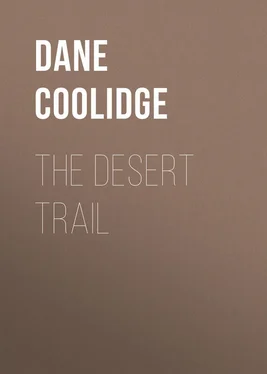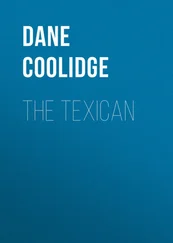Dane Coolidge - The Desert Trail
Здесь есть возможность читать онлайн «Dane Coolidge - The Desert Trail» — ознакомительный отрывок электронной книги совершенно бесплатно, а после прочтения отрывка купить полную версию. В некоторых случаях можно слушать аудио, скачать через торрент в формате fb2 и присутствует краткое содержание. ISBN: , Жанр: foreign_prose, на английском языке. Описание произведения, (предисловие) а так же отзывы посетителей доступны на портале библиотеки ЛибКат.
- Название:The Desert Trail
- Автор:
- Жанр:
- Год:неизвестен
- ISBN:http://www.gutenberg.org/ebooks/52358
- Рейтинг книги:5 / 5. Голосов: 1
-
Избранное:Добавить в избранное
- Отзывы:
-
Ваша оценка:
- 100
- 1
- 2
- 3
- 4
- 5
The Desert Trail: краткое содержание, описание и аннотация
Предлагаем к чтению аннотацию, описание, краткое содержание или предисловие (зависит от того, что написал сам автор книги «The Desert Trail»). Если вы не нашли необходимую информацию о книге — напишите в комментариях, мы постараемся отыскать её.
The Desert Trail — читать онлайн ознакомительный отрывок
Ниже представлен текст книги, разбитый по страницам. Система сохранения места последней прочитанной страницы, позволяет с удобством читать онлайн бесплатно книгу «The Desert Trail», без необходимости каждый раз заново искать на чём Вы остановились. Поставьте закладку, и сможете в любой момент перейти на страницу, на которой закончили чтение.
Интервал:
Закладка:
But De Lancey, made suddenly aware of his indiscretion, was making all kinds of exaggerated signs for silence, and Bud stopped with a slow, good-natured smile.
"S-s-st!" hissed De Lancey, touching his finger to his lips. "Don't say it – somebody might hear you!"
"All right," agreed Bud; "and don't you say it, either. I hate to knock, Phil," he added, "but sometimes I think the old man was right when he said you talk too much."
"Psst!" chided De Lancey, shaking his finger like a Mexican. Tiptoeing softly over to Bud, he whispered in his ear: "S-s-st, I can hear the feller in the next room – shaving himself!"
Laughing heartily at this joke, they went downstairs for supper.
VI
If the Eagle Tail mine had been located in Arizona – or even farther down in Old Mexico – the method of jumping the claim would have been delightfully simple.
The title had lapsed, and the land had reverted to the government. All it needed in Arizona was a new set of monuments, a location notice at the discovery shaft, a pick and shovel thrown into the hole, and a few legal formalities.
But in Mexico it is different. Not that the legal formalities are lacking – far from it – but the whole theory of mines and mining is different. In Mexico a mining title is, in a way, a lease, a concession from the general government giving the concessionaire the right to work a certain piece of ground and to hold it as long as he pays a mining tax of three dollars an acre per year.
But no final papers or patents are ever issued, the possession of the surface of the ground does not go with the right to mine beneath it, and in certain parts of Mexico no foreigner can hold title to either mines or land.
A prohibited or frontier zone, eighty kilometers in width, lies along the international boundary line, and in that neutral zone no foreigner can denounce a mining claim and no foreign corporation can acquire a title to one. The Eagle Tail was just inside the zone.
But – there is always a "but" when you go to a good lawyer – while for purposes of war and national safety foreigners are not allowed to hold land along the line, they are at perfect liberty to hold stock in Mexican corporations owning property within the prohibited zone; and – here is where the graft comes in – they may even hold title in their own name if they first obtain express permission from the chief executive of the republic.
Not having any drag with the chief executive, and not caring to risk their title to the whims of succeeding administrations, Hooker and De Lancey, upon the advice of a mining lawyer in Gadsden, had organized themselves into the Eagle Tail Mining Company, under the laws of the republic of Mexico, with headquarters at Agua Negra. It was their plan to get some Mexican to locate the mine for them and then, for a consideration, transfer it to the company.
The one weak spot in this scheme was the Mexican. By trusting Aragon, Henry Kruger had not only lost title to his mine, but he had been outlawed from the republic. And now he had bestowed upon Hooker and De Lancey the task of finding an honest Mexican, and keeping him honest until he made the transfer.
While the papers were being made out there might be a great many temptations placed before that Mexican – either to keep the property for himself or to hold out for a bigger reward than had been specified. After his experience with the aristocratic Don Cipriano Aragon y Tres Palacios, Kruger was in favor of taking a chance on the lower classes. He had therefore recommended to them one Cruz Mendez, a wood vender whom he had known and befriended, as the man to play the part.
Cruz Mendez, according to Kruger, was hardworking, sober, and honest – for a Mexican. He was also simple-minded and easy to handle, and was the particular man who had sent word that the Eagle Tail had at last been abandoned. And also he was easy to pick out, being a little, one-eyed man and going by the name of "El Tuerto."
So, in pursuance of their policy of playing a waiting game, Hooker and De Lancey hung around the hotel for several days, listening to the gossip of Don Juan de Dios and watching for one-eyed men with prospects to sell.
In Sonora he is a poor and unimaginative man indeed who has not at least one lost mine or "prospecto" to sell; and prosperous-looking strangers, riding through the country, are often beckoned aside by half-naked paisanos eager to show them the gold mines of the Spanish padres for a hundred dollars Mex.
It was only a matter of time, they thought, until Cruz Mendez would hunt them up and try to sell them the Eagle Tail; and it was their intention reluctantly to close the bargain with him, for a specified sum, and then stake him to the denouncement fees and gain possession of the mine.
As this was a commonplace in the district – no Mexican having capital enough to work a claim and no American having the right to locate one – it was a very natural and inconspicuous way of jumping Señor Aragon y Tres Palacios's abandoned claim. If they discovered the lead immediately afterward it would pass for a case of fool's luck, or at least so they hoped, and, riding out a little each day and sitting on the hotel porch with Don Juan the rest of the time, they waited until patience seemed no longer a virtue.
"Don Juan," said De Lancey, taking up the probe at last, "I had a Mexican working for me when we were over in the Sierras – one of your real, old-time workers that had never been spoiled by an education – and he was always talking about 'La Fortuna,' I guess this was the place he meant, but it doesn't look like it – according to him it was a Mexican town. Maybe he's around here now – his name was Mendez."
"José Maria Mendez?" inquired Don Juan, who was a living directory of the place. "Ricardo? Pancho? Cruz?"
"Cruz!" cried De Lancey. "That was it!"
"He lives down the river a couple of miles," said Don Juan, "down at Old Fortuna."
"Old Fortuna!" repeated Phil. "I didn't know there was such a place."
"Why, my gracious!" exclaimed Don Juan de Dios, scandalized by such ignorance. "Do you mean to say you have been here three days and never heard about Fortuna Vieja? Why, this isn't Fortuna! This is an American mining camp – the old town is down below.
"That's where this man Aragon, the big Mexican of the country, has his ranch and store. Spanish? Him? No, indeed — mitad ! He is half Spanish and half Yaqui Indian, but his wife is a pure Spaniard – one of the few in the country. Her father was from Madrid and she is a Villanueva – a very beautiful woman in her day, with golden hair and the presence of a queen!
"No, not Irish! My goodness, you Americans think that everybody with red hair is Irish! Why, the most beautiful women in Madrid have chestnut hair as soft as the fur of a dormouse. It is the old Castilian hair, and they are proud of it. The Señora Aragon married beneath her station – it was in the City of Mexico, and she did not know that he was an Indian – but she is a very nice lady for all that and never omits to bow to me when she comes up to take the train. I remember one time – "
"Does Cruz Mendez work for him?" interjected De Lancey desperately.
"No, indeed!" answered Don Juan patiently. "He packs in wood from the hills – but as I was saying – " and from that he went on to tell of the unfailing courtesy of the Señora Aragon to a gentleman whom, whatever his present station might be, she recognized as a member of one of the oldest families in Castile.
De Lancey did not press his inquiries any further, but the next morning, instead of riding back into the hills, he and Bud turned their faces down the cañon to seek out the elusive Mendez. They had, of course, been acting a part for Don Juan, since Kruger had described Old Fortuna and the Señor Aragon with great minuteness.
Читать дальшеИнтервал:
Закладка:
Похожие книги на «The Desert Trail»
Представляем Вашему вниманию похожие книги на «The Desert Trail» списком для выбора. Мы отобрали схожую по названию и смыслу литературу в надежде предоставить читателям больше вариантов отыскать новые, интересные, ещё непрочитанные произведения.
Обсуждение, отзывы о книге «The Desert Trail» и просто собственные мнения читателей. Оставьте ваши комментарии, напишите, что Вы думаете о произведении, его смысле или главных героях. Укажите что конкретно понравилось, а что нет, и почему Вы так считаете.












